p.2184
p.2188
p.2192
p.2196
p.2202
p.2206
p.2210
p.2214
p.2217
A Study of Listening Training Materials for Chinese Colleges Students in Second Language Acquisition
Abstract:
In classroom, students do more listening than reading. Listening competence is “larger” than speaking. The significance of listening in second language acquisition can never be overestimated. Listening comprehension has been a focus for college English learning for years in China. With the information obtained from listening, learners build up their own linguistic system and are ready to retrieve whatever they want when they speak and write. There are many factors that affect listening, among which materials play a key role in facilitating listening comprehension. In order to achieve the final goal of promoting listening competence, teacher must realize that listening materials should be tailored to the needs of individuals. Based on the exploration of the nature of listening comprehension, this paper verifies the elements hindering learners’ listening competence on the basis of the need analysis and Krashen’s input hypothesis. With a questionnaire conducted at Wuhan Polytechnic University ,and the author accordingly concludes that a feasible materials should meet the learners’ requirements so that the enhancement of listening comprehension can be achievd.
Info:
Periodical:
Pages:
2202-2205
Citation:
Online since:
February 2011
Authors:
Keywords:
Price:
Сopyright:
© 2011 Trans Tech Publications Ltd. All Rights Reserved
Share:
Citation:


